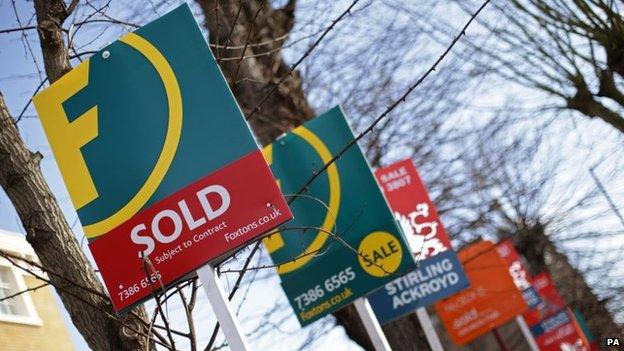Osborne should spell out welfare cuts, says IFS
- Published
Cutting £12bn from welfare spending will require "radical changes" according to Paul Johnston, of the Institute for Fiscal Studies
Chancellor George Osborne needs to spell out exactly how he plans to cut £12bn from welfare spending, says the independent forecaster the Institute for Fiscal Studies (IFS).
Only £2bn of these £12bn cuts have been outlined so far, said IFS director Paul Johnson, in response to the Budget.
Yet all the cuts are supposed to be in place by 2017-18, he said.
Mr Johnson added that it was important to know ahead of the general election what "radical changes" were planned.
'Frustrating'
Spending cuts planned for 2016-17 and 2017-18 would be "twice the size of any year's cuts over this parliament", said Mr Johnson, if the £12bn of cuts already announced and the Chancellor's hoped-for £5bn of anti tax avoidance measures failed to materialise.
Budget 2015
Planned spending cuts
£30bn
in cuts by 2017
-
£13bn reduction in government departmental spending
-
£12bn reduction in welfare spending
-
£5bn tackling tax evasion & avoidance
But, ahead of the election, the IFS said it had been left "guessing" how these cuts were going to be achieved, said Mr Johnson, admitting that the lack of detail was "frustrating".
"You're going to have to do things like further big cuts in child benefit, or really substantial cuts to housing benefit or significant cuts to disability benefits," he said.
"He's announced about £2bn [of cuts] and we know nothing about where the further £10bn are coming from."
"He will have to implement some significant cuts in some significant benefits."
Our economics editor Robert Peston said, external: "It won't remotely be easy to find that sum in the next few years. As the IFS points out, he has already made some of the simpler savings."
The IFS said that Labour and the Liberal Democrats would not cut spending as sharply, were they to win power, but government borrowing and debt would be reduced fastest under the Conservatives.
Help to Buy ISAs
The IFS warned that the new "Help to Buy" ISA, external [individual savings account] proposed by the chancellor could result in a temporary fall in first-time buyer activity in the housing market.

This is because would-be buyers may delay property purchases to make the most of government top-ups.
Under the proposed scheme, the government will add £50 for every £200 saved towards a deposit in the ISA.
Stuart Adam, of the IFS, also speculated that the scheme could have an inflationary effect on house prices.
Household incomes
Commenting on the economic effect of the recession and the government's tax and benefit changes, Mr Johnson said UK households had experienced "the slowest recovery in incomes in modern history".
While average household incomes have "just about" regained their pre-recession levels, the recovery had not been felt equally by all sections of society, he said.
"Average incomes among pensioners have risen, among those of working age they have fallen, with especially big falls for those in their 20s," said Mr Johnson.
Earnings, taking the effect of inflation into account, have fallen, but should still be above their 2010 levels, he continued.
There was some dispute in the Commons about how much better or worse off families have been in this parliamentary term.
The chancellor said that households would be £900 better off in terms of all income 2015 than in 2010. Labour leader Ed Miliband said that people were £1,600 worse off in terms of workers' earnings in 2014 than in 2010.
Mr Johnson said that "there is much truth in both numbers".
"Real earnings have fallen, as Mr Miliband says. Real incomes should be above their 2010 level as Mr Osborne says," he said
"We are for sure much worse off on average than we could reasonably have expected to be back in 2007 or indeed back in 2010."
The IFS concluded that the richest have been "hit hardest" by the government's tax changes over the last parliament.
But it said that benefit cuts had "hit low income working age people".
The chancellor's plan to increase the amount that can be earned before paying income tax - the personal allowance - to £11,000 by 2017-18 would benefit basic rate taxpayers by £48 a year by 2017-18 and higher rate taxpayers would benefit by an average of £72 a year, the IFS said. This plan would not be reversed under Labour.